Entry
One Hundred Forty-Five.
Tuesday, 2011.09.20, 3:03 PM CST.
The
Fall 2010 Chronicles, Part II: Meeting Alan Wilder.
Current Mood: Accomplished?
Sure. Why not?
Current Scent: None.
It
may or may not be interesting to you to know that this Journal Entry,
along with the previous one, have been typed out while in a courthouse
awaiting a trial. Not my trial, though. As I type,
I am doing jury duty, in the lower level of the Tulsa County Courthouse,
serving along with 200 or so other potential jurors, waiting to be chosen
for a case to help determine someone's fate.
I'd
really rather not be called up. I'd much rather sit here and update
my site.

The
gentleman standing with me in the picture above is Alan Charles Wilder.
A lot of you have no idea who this person is, nor why he's such a big
deal to me.
Alan
Wilder was a member of Depeche Mode (my favourite music group, whose
work I've collected since 1987) from 1982 to 1995. Martin Gore
was (and still is) the primary songwriter, but Alan Wilder had a good
hand in crafting how the songs actually sounded. He was
arguably the most talented musician in the group. In fact, the
Depeche Mode version of Beethoven's "Moonlight Sonata," released
as a B-side to "Little 15" back in 1988, was really just Alan
Wilder's solo performance of the song.
(Incidentally,
when I first discovered the world of "imported" singles back
in late 1988, the German release of "Little 15" was the
first imported DM 12" single that I ever purchased - and Wilder's
version of "Moonlight Sonata" was one of the main reasons
I chose it first.)
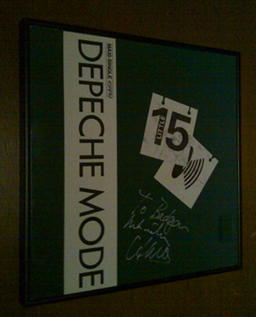
The autograph reads:
"To Badger, best wishes, A Wilder." I think. :)
Back
in the 1980s, Wilder decided to start releasing his own musical pieces
under the solo project name of Recoil. Although he continued (and
has continued) to release Recoil albums, he didn't leave Depeche Mode
until 1995, and he didn't actually tour as Recoil for another
fifteen years after that. By and large, with the possible exception
of 1992's Bloodline (incidentally, my favourite Recoil album),
his works were significantly more "experimental" in nature
than Depeche Mode.
Last
year, my old friend and DJ mentor Dave French (see previous
Journal Entry) sent me a message via Facebook to let me know that
Alan Wilder, as Recoil, was going to be performing at the Trees venue
in Dallas on October 16th. I was geeked, and my wife and I attended
the show along with Dave and his girlfriend Lori.
The
show began with Alan Wilder himself coming to the stage to welcome everyone,
talk a bit about the Recoil project, and inform us of what we'd be experiencing
during the show.
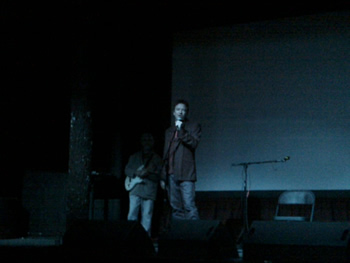
Wilder
then introduced blues guitarist Joe Richardson, who had provided vocals
and music for some of the tracks on Recoil's SubHuman album.
The Dallas Recoil show was one of the very few Recoil concerts
(two? three?) which included Richardson, so this was a really
big deal.
I'm
happy to report that Richardson was an impressive performer, and he
even took the time to sit and talk about his experiences with Alan Wilder
as well as a little of the history of blues music. Although a
lot of the crowd may have ben confused because they weren't expecting
any blues to be played, Ricardson's set was fantastic.
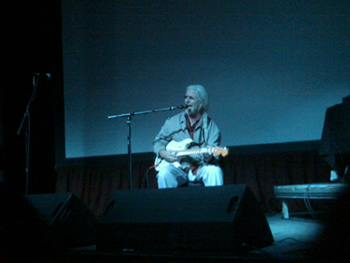
The
show continued with Architect, a one-man project of Daniel Myer.
I was somewhat excited about this, but wasn't familiar with Architect's
work.
Dear.
Holy. God. Three things immediately became evident:
- Architect
likes to inject a lot of noise and stuttering into his work.
I'm very cool with that.
- Architect
likes to use a lot of bass. Usually, I'm very cool with that
as well.
- Architect
likes his set LOUD. Not just normally loud. Not just exceptionally
loud. UNBEARABLY loud.
Now,
I know what you may be thinking: "When did you turn into
a crotchety old dude, Badger?"
I
don't think you understand. I don't mind some loud music.
This was insane. Architect's set was cranked up SO loudly that
it hurt. That's not an exaggeration. That's not just me
trying to be dramatic. The throbbing, stuttering bass was coming
out so hard and SO FREAKING LOUDLY that it quite literally started giving
me pain in my chest.
In
all of my days going to concerts, I have never heard, nor have I felt,
anything like what Architect was serving up. That's not a compliment.
It was absolutely unreasonable.
A
few minutes into Architect's performance, Lanna and I sought refuge
outside. Dave and Lori joined us, and a number of others did as
well. Eventually, I started hearing something familiar booming
inside: Architect was interweaving one of my favourite Kraftwerk
songs, "Computerwelt," into his set! I stepped inside,
"just in case" he might have toned it down... but I didn't
last long. It was still painful, and I was still more than willing
to head back outside.
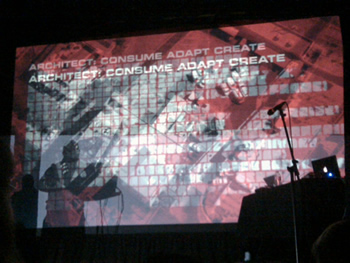
After
Architect's set mercifully came to a close, we all headed back inside
for Recoil's set.
Alan
Wilder was joined onstage by Paul Kendall (aka the producer "PK").
The set was phenomenal, with full screen shows accompanying each and
every track. Not only did the show include a number of Recoil
standards that I'd been expecting (like "Strange Hours" and
the spectacular "Prey"), there were many surprises in store.
For
one thing, Joe Richardson came back onstage to provide live vocals and
guitar. That was pretty incredible.

Also,
I had already known that Depeche Mode's "Never Let Me Down Again"
was going to be incorporated into the set... but I had no idea that
Wilder was going to work in a whole presentation of DM's "In Your
Room" (utilizing the Apex and Jeep Rock mixes, with lots of nudity
in the screen show, which I certainly didn't mind). That was one
of the high points of the show.
The
encore, however, was especially stunning. It included a mash-up
of Recoil's gospel-based "Jezebel" (not to be confused with
the rather weak 2009 Depeche Mode ballad of the same name), whose vocals
were layered on top of an instrumental collage mainly built from one
of my all-time DM favourites, "Walking in My Shoes."
WOW.
Wilder
finished off the performance with a version of DM's "Personal Jesus,"
incorporating pieces of the rare Boys Noize Rework of the song and mixing
in elements from Recoil's 1992 track, "Edge To Life."
It was a great way to end a remarkable set.
After
the performance, lots of people stuck around while a DJ played a rather
weak mixture of Depeche Mode and loosely-Depeche-Mode-related tracks.
Eventually, we all got to get in line to meet Alan Wilder himself.
It was quite entertaining chatting with the other fans, many of whom
were quite inebriated by this point, and having discussions about things
like which Depeche Mode albums were the best.
(Just
so that you know: The correct answers are Black Celebration,
Violator, Songs of Faith and Devotion and Music
for the Masses. Playing the Angel would probably
round out my top five. If anyone tells you that Exciter,
A Broken Frame, or especially Sounds of the Universe
are in any way examples of Depeche Mode's best work... then he/she is
incorrect.)
When
I finally got to meet Alan Wilder, he was delightful. He couldn't
chat for long due to the length of the line, but I told him that he
was a big inspiration to me, and that his surprise appearance/performance
with Depeche Mode at the 2010 Royal Albert Hall charity event really
meant a lot to the fans. Overall, I'm happy to report that he
was extremely friendly and a pleasure to meet.
Plus,
I now have autographed copies of the German "Little 15" single,
the album Black Celebration (I have mentioned that it's Depeche
Mode's best album, right? Oh, yeah, I have...), and Recoil's Bloodline
in my Depeche Mode collection. I'm quite thrilled with that.
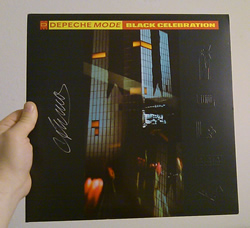
Overall,
it was an incredible night - one that I won't soon forget. Not
only did I get to reunite with the man who taught me how to DJ after
a span of almost 12 years, but I got to meet a world-renowned musician
whose music had also served to influence me for well over two decades.
In
fact, it was such an incredible night that I'm throwing in this picture
again, just for good measure:

More
soon!
Badger
|